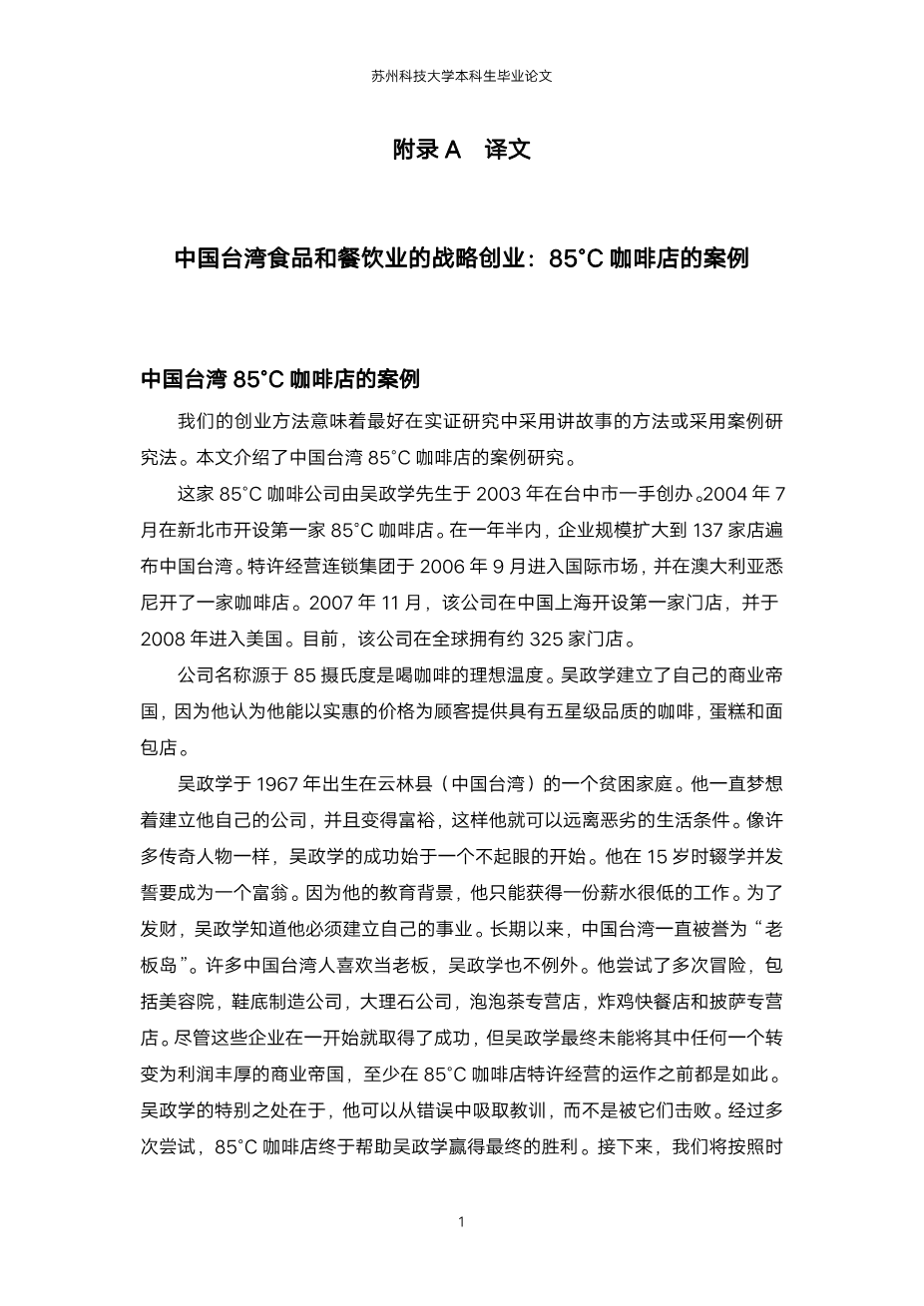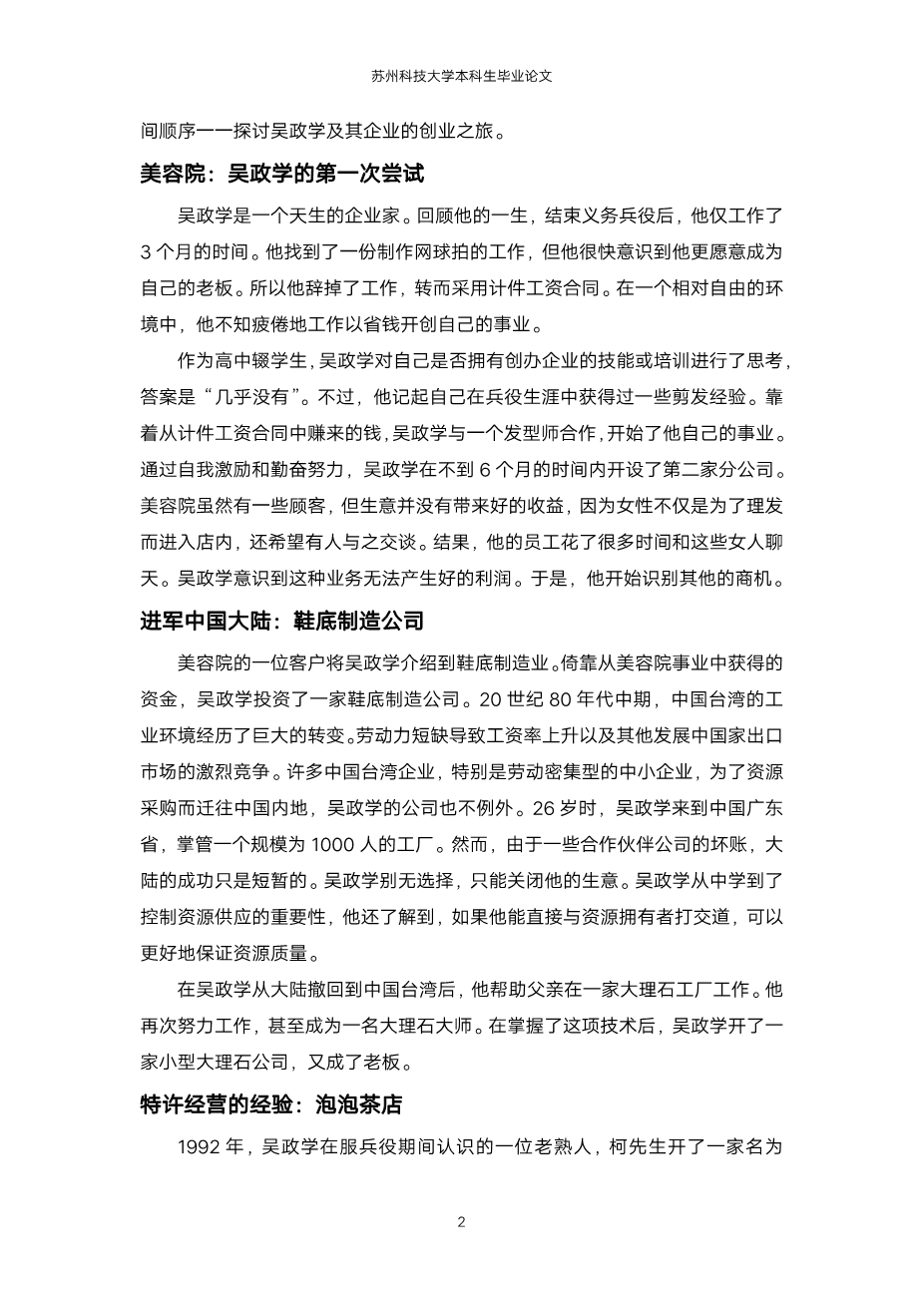附录B 外文原文
Strategic Entrepreneurship in Taiwan’s Food and Catering Industries:The Case of 85°C Café Shop
The Case of 85 °C Café Shop in Taiwan
Our entrepreneurial approach means that it is preferable to use the storytelling approach7 or case study in empirical studies. This article presents a case study of 85 °C Café shop in Taiwan.
The 85 °C Coffee8 company was established in Taichung City by Mr Wu Cheng Hsueh in 2003. The first 85 °C Café was opened in New Taipei City in July 2004. Within one and a half years, the enter-prise expanded to 137 shops throughout Taiwan. The franchisee chain group entered the international market in September 2006 and opened a cafe in Sydney, Australia. In November 2007, the company opened its first store in Shanghai, China, and ventured into United States in 2008. It has now about 325 stores in the world.
The company name originated from the idea that 85 degree Celsius is the ideal temperature to drink coffee. Wu Cheng Hsueh established his business empire because he thought that he can provide customers with five-star quality coffee, cake and bakery at an affordable price.
Wu was born into a poor family in Yunlin County (Taiwan) in 1967. He always dreamed of setting up his own company, and became rich so that he could stay away from poor living conditions. Like many legendary figures, Wu started from a humble beginning. He dropped out of school at the age of 159 and vowed to become a rich person. With his educational background, he could only get a job with a small salary. To make a fortune, Wu knew that he had to set up his own business. Taiwan has long been boasted as ‘the Island of Bosses’. Many Taiwanese enjoy being a boss. Wu is no exception. He was involved in several ventures including, beauty shop, footwear, marble company, a bubble tea franchise, roast chicken fast-food business and a pizza franchise. Although these businesses enjoyed success in the beginning, Wu failed to turn any of them into a lucrative business empire in the end. At least not until the operation of 85 °C Café franchise. What is special for Wu Cheng Hsueh is the fact that he could learn from his mistakes, instead of being defeated by them. After numerous attempts, the 85 °C Café finally helped Wu win the ultimate trophy. In what follows, we shall examine the entrepreneurial process conducted by Wu associated with his ventures chronologically.
The Beauty Salon: Wu’s First Attempt
Wu is a born enterpriser. Throughout his whole life, he only worked as an employee for 3 months after he finished his obligated military service. He got a job of making tennis rackets, but soon realized he preferred to be his own boss. So he quit the job and shifted into a piece rate contract arrangement. In a comparatively free environment, he worked tirelessly to save money to start his own business.
As a dropout from high school, Wu examined what kind of skills or training he owned in order to start a business. The answer was ‘hardly any’. Still, he remembered he earned some experience in hair cutting from his military service. With the money earned from the piece rate contract, Wu teamed up with a hairstylist and started his own business. Self-motivated and hardworking, Wu opened a second branch in less than 6 months. Though the shops had some customers, the business did not make good revenue because women came into the shop not just for their hair, they also wanted someone to talk to. As a result, his employees spent a lot of time chatting with these women. Wu learnt that this kind of business could not yield good profit. Therefore, he started to spot other business opportunities.
Venturing into Mainland China: The Footwear Sole Manufacturing Company
One of Wu’s customers in the salon introduced Wu into the footwear sole manufacturing industry. With money saved from the beauty salon business, Wu invested in a firm manufacturing footwear sole. In the mid-1980s, the industrial environment in Taiwan experienced vast transition. Labour shortage resulted in increased wage rates as well as keen competition in the export market from other developing countries. A lot of Taiwanese firms, especially the labour-intensive SMEs, thus moved to mainland China for resources sourcing. Wu’s company was no exception. At the age of 26, Wu moved to Guangdong Province of China, in charge of a factory sized 1,000 workers. However, the success in the mainland was short-lived due to the bad debts of some fellow partner companies. Wu had no choice but to close down his business. Wu learnt the significance of controlling the resource supply. Wu also learnt that if he could deal directly with the resource owners, the quality of resources could be better maintained.
After Wu retreated from China to Taiwan, he helped his father in a marble factory. Again, he worked hard and even learned to become a marble master himself. Having learnt the technique, Wu opened a small marble company and became a boss again.
The Experience of Franchise Business: The Bubble Tea Shop
In 1992, a Wu’s old acquaintance from the military service, Mr Ko Wen-Ho opened a bubble teashop called ‘Easy Way’; Ko invited Wu to join the franchise. Wu soon realized that business franchising is a profitable method to expand business. When Ko’s bubble teashop went international, Wu was invited to take charge of marketing Easy Way in Taiwan.
One of Wu’s talents was his keen eye to spot the demand and the market trend. He spent a lot of time mingling with people, making new acquaintances. He kept alert to the changes in the world market. As soon as he could identify a product or service that could attract consumers, he quickly ventured on it without hesitation. This is why whenever he started up a new business, the business soon became a po
全文共7665字,剩余内容已隐藏,支付完成后下载完整资料


英语译文共 3 页,剩余内容已隐藏,支付完成后下载完整资料
资料编号:[450751],资料为PDF文档或Word文档,PDF文档可免费转换为Word


